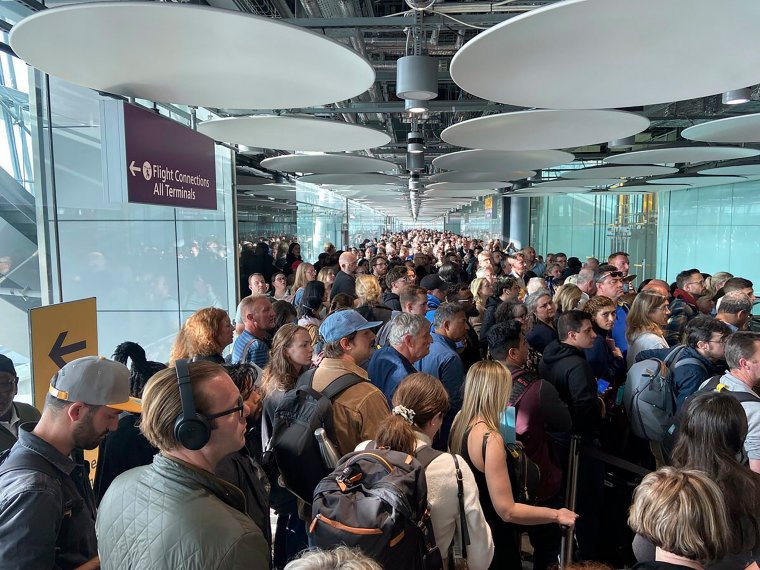The Home Office was warned about potential failings with passport e-gates 16 months ago amid confusion over who bore responsibility for any technical issues.
Vision-Box is contracted by the Home Office to manage the passport e-gates that malfunctioned over the bank holiday and risk further threatening airports across the UK this summer.
In a report to parliament by David Neal, the independent chief inspector of borders and immigration (ICIBI), in January last year, the company, which is based in Portugal, raised concerns with inspectors about a missing “system integration” – to manage and assess the performance of the e-gates.
The 104-page report found “some confusion within the Home Office over which business area” would perform the system integration role.
It comes after a weekend of chaos caused by malfunctioning e-gates at major UK airports, with long queues building up at Heathrow, Gatwick and Manchester.
Experts previously told i that the Government needs to invest in the system and ensure there is “robust digital technology” to avoid similar disruption during the peak travel season.
The January 2022 report also found that manual logs “for recording faults and incidents at the gates” were poorly maintained and as such, “identifying patterns and trends is difficult”.
Over three months in 2019, there were 23 occasions when all e-gates were not working in a single airport space, the report found.
Vision-Box told inspectors that the programme was missing “system integration”, with no clear structure for who is responsible for overseeing the system. They said the Home Office and two of its IT units were “confused” about who should be fulfilling the crucial role.
The report made a series of recommendations to the Home Office, including to “implement standardised methods for recording complaints at the gates, ensuring that trends can be identified, categorised, and analysed”.

John Grant, aviation analyst at OAG, a global travel data provider, said this means there is “not enough oversight from the Home Office about how the system works”.
“There doesn’t seem to be clear accountability,” he told i, adding: “You would have expected some of the recommendations to have been implemented by now.”
The Home Office said the chaos seen over the bank holiday was due to “a technical border system fault which affected e-gate arrivals into the UK” and that all e-gates are now operating as normal.
But industry experts are concerned that not enough has been done to avoid further disruption, calling for urgent investment.
Commenting on the report, Mr Grant, from OAG, said: “It doesn’t surprise me that an independent assessment concluded the e-gates system and the organisation [Vision-Box] is struggling to cope with a lack of resources, a lack of investment, a lack of people, and subsequently is increasingly prone to fail.
“The events of the weekend were not by any means unique in the e-gate story.”
He said problems with e-gates contributed to long queues last summer which ended up snaking around airports in some cases.
Asked whether this could happen again, Mr Grant said: “Without investment and without a more resilient process, absolutely.”
He added that the Home Office needs to “sort out whatever is the underlying issue that makes this system collapse on a regular basis”.
“If they have not yet identified what is the problem, then there’s a lot of work to be done just to get to a position where they understand what makes this go down,” he added.
He said the impact of these problems with e-gates not being resolved is “brand UK reputational damage” as visitors are welcomed into the country with long queues and disorganisation.
Passengers waiting in long queues, as well as airlines and airports, are also impacted by the problems with e-gates.
He said delays are “increasingly significant” as airports and airlines are “under pressure to process people as quickly as possible”.
Julia Lo Bue-Said, CEO of The Advantage Travel Partnership, said e-gates allow for a “smooth and much faster border experience” but there needs to be sufficient investment in the technology to make this worthwhile.
“If we are to rely heavily on technology, there needs to be sufficient investment in the technologies used in travel to ensure that these systems run smoothly,” she said.
Analysis of procurement notices by Tussell, published by The Times, found that Vision-Box has been paid £50m since 2016. Tussell specialises in analysing government contracts and spending.
A Home Office spokesperson said: “Following a technical border system fault which affected e-gate arrivals into the UK, we can confirm all e-gates are now operating as normal.
“We thank those travellers who were impacted for their patience and staff for their work in resolving the issue.”
But the government department did not comment on the technical issues raised in the ICIBI report.
Vision-Box did not respond to a request for comment.


